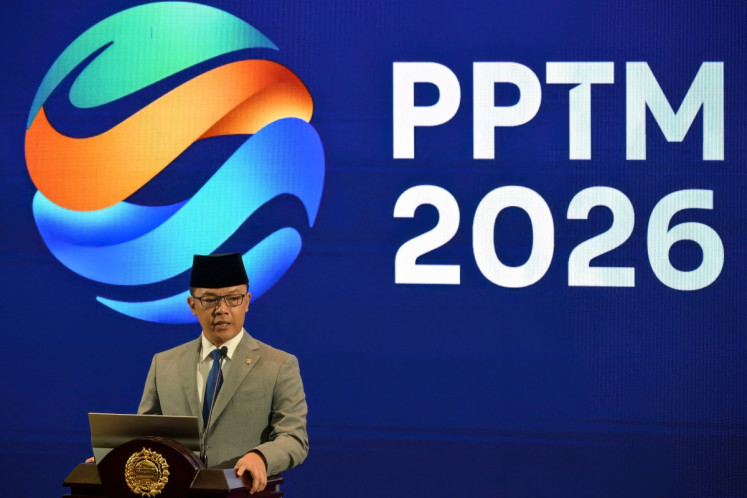Popular Reads
Top Results
Can't find what you're looking for?
View all search resultsPopular Reads
Top Results
Can't find what you're looking for?
View all search resultsAnalysis: Improving tourism through collaborative promotion
The Travel and Tourism Competitiveness Report 2019 recently released by the World Economic Forum (WEF) shows that Indonesia ranks 40th (with a value of 4
Change text size
Gift Premium Articles
to Anyone
The Travel and Tourism Competitiveness Report 2019 recently released by the World Economic Forum (WEF) shows that Indonesia ranks 40th (with a value of 4.3) among 140 countries, up two spots from 2017. The index measures aspects that contribute to the development and competitiveness of travel and tourism in a country.
The report takes into account the enabling environment component (business environment, safety and security, health and hygiene, human resources and labor market and information and communication technology [ICT] readiness), travel and tourism (T&T) policy and enabling conditions (prioritization of T&T, international openness, price competitiveness and environmental sustainability), infrastructure (air transportation infrastructure, ground and port infrastructure and tourist service infrastructure) and natural and cultural resources (business travel and natural and cultural resources).
Indonesia's highest achievement is in T&T policy and enabling conditions with a score of 5.0 (ranked fourth). Its lowest score is in infrastructure (in the tourist services infrastructure sub-index) with a value of 3.1, which has been stagnant since 2017.
The ICT readiness sub-index increased quite high by 0.9 points to 4.7. This is due to the rapid development of digital technology throughout the world. Indonesia's health and hygiene sub-index also experienced a significant increase after that of Japan.
Furthermore, based on the income group classification, Indonesia is in the lower-middle income group with an income per capita range of US$996 to $3,895. Indonesia is included among the middle-class countries where tourism is growing.
Middle-class countries mostly own natural resources and culture that have the potential to become tourist destinations. However, the level of their human resources’ readiness to anticipate this potential remains relatively low. Hence, this is one of the reasons why natural resources and culture in tourism cannot be fully utilized in attracting tourists.
Indonesia’s travel services recorded a surplus of $1.37 billion in trade balance during the third quarter. The figure increased 27 percent from the second quarter. The balance of travel services is calculated from total travel spending by foreign tourists in Indonesia minus Indonesians’ spending on trips abroad.
This surplus is a mainstay to offset the balance in transportation services, which is always in deficit. The fact that foreign tourists continue to increase their spending in Indonesia has become a source for the government and the central bank to boost foreign exchange reserves. The government expects tourism to contribute $20 billion to the reserves by year-end.
Tourism offers not only beautiful landscapes and tours but also other things, such as accommodation, transportation, culinary experiences, handicrafts and retail trade. Therefore, the sector has potential economic and social benefits and a multiplier effect that spills over to various fields.
The most critical challenge in developing tourism in Indonesia is inadequate infrastructure to reach destinations. Furthermore, training is lacking to turn people into capable tour guides and accommodation service providers, for instance, or for micro, small and medium enterprises (MSMEs) to enable them be competitive and make quality products for tourists.
Another aspect to be considered is the possibility of tourist destinations being affected by natural disasters. In such circumstances, post-disaster recovery must be carried out faster, especially if a disaster occurs at a popular tourist destination. The government needs to formulate specific disaster mitigation strategies and action plans for each destination.
Then there are overseas promotion strategies, which are very important in attracting tourists. There should be good collaboration among tourism stakeholders, which are the government, travel agents, transportation operators, Indonesian migrant workers, overseas students, travelers and even vloggers.
Travel agents could create tour packages and promotional programs while the government, through the Tourism and Creative Economy Ministry and Indonesian embassies abroad, should promote the programs and create promotional events. The government could also work with migrant workers, foreign students, travelers and vloggers to promote the tourist programs and packages.
The diaspora could gain benefit in the form of points, for instance, if someone buys a package and visits Indonesia at their recommendation. The points could be used to deduct the cost of travel if they want a vacation or to return to Indonesia.
Promotional programs, such as for vacations, could be made into trips that last seven day or more. Travel agents could also offer prizes to those who travel in large groups. The larger the group, the bigger the prize. If possible, there should be holiday programs with relatively lower costs but with longer stays.
For family vacations or corporate packages, the offering should be more diverse and flexible according to the needs of foreign tourists. The packages should include accommodation and amenities, transportation, culinary experience and unique souvenirs from the destinations visited.
Indonesia's tourism promotion strategy should be more effective to target foreign markets through such collaborative efforts. Also in that way, every Indonesian abroad could contribute to and benefit from the country’s tourism development.










